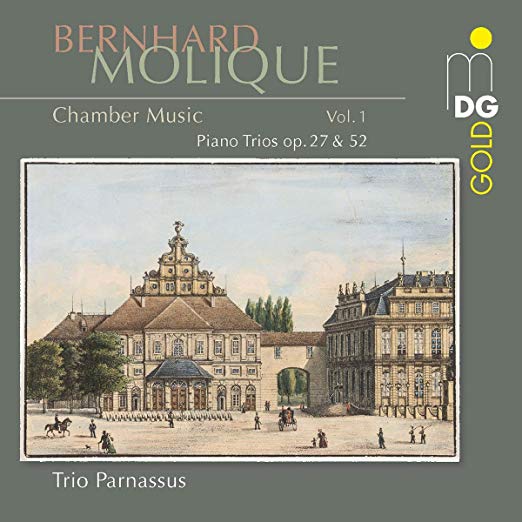

German violinist and composer Wilhelm Bernhard Molique (1802-1869) was an exact contemporary of Schumann and Berlioz, amongst others, but sounds nothing like either of these. On first listen his style sounds somewhat like an upbeat Beethoven, but after repeated listening sessions his own unique personality and character come to the surface. As soon as the opening Allegro movement of the Piano Trio Op. 27 is set in motion, one can't help but notice a strong and fluid momentum within each individual voice that when combined together remove any hint of theoretical rigidity sometimes present within Beethoven's music. Even the Adagio movement of this first Trio is governed by a highly passionate pulse. The music always produces a sense of anticipatory excitement. There's also plenty of innovation at play here. The pizzicato cello set against the highly melodic writing in the piano in the second movement of the Piano Trio Op. 52 is not only unusual for its time but also quite evocative. Especially noteworthy is Molique's natural and spontaneous harmonic development which never sounds contrived or predictable like so many other composers of that era. A composer simultaneously conservative and innovative.
The Trio Parnassus have covered the Trios by the obvious usual suspects like Mozart and Beethoven, but they've also gone far afield and recorded the Piano Trios of Chaminade, Widor, Lalo, Korngold, and some that I've reviewed in the past including Boellmann, Godard and Gade. The chamber music trio is my favorite formation in classical music as it allows for the ideal harmonic crosstalk between the instruments without becoming opaque. And the members of the Trio Parnassus communicate so well with each other that everything sounds seamless, and within this precise ensemble work they always focus on the music's core narrative and infuse it with a dramatic pulse all their own. Even the most mundane or pedantic passages of a piece of music come to life under their commited playing. To the best of my knowledge this seems to be the world premiere recording of these grossly neglected chamber works. I for one am looking forward to Volume 2.
Jean-Yves Duperron - May 2019